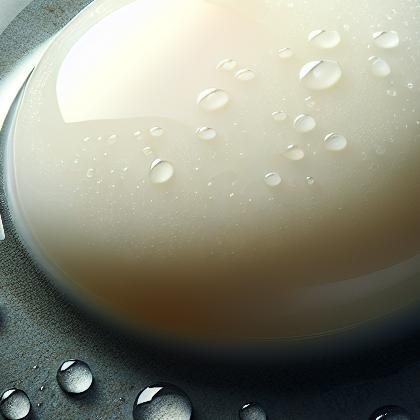Egg White

Egg white is the common name for the clear liquid (also called the albumen or the glair/glaire) contained within an egg. In chickens it is formed from the layers of secretions of the anterior section of the hen's oviduct during the passage of the egg. It forms around fertilized or unfertilized egg yolks. The primary natural purpose of egg white is to protect the yolk and provide additional nutrition for the growth of the embryo (when fertilized). Egg white consists primarily of about 90% water into which is dissolved 10% proteins (including albumins, mucoproteins, and globulins). Unlike the yolk, which is high in lipids (fats), egg white contains almost no fat, and carbohydrate content is less than 1%. Egg whites contain just over 50% of the protein in the egg. Egg white has many uses in food (e.g. mousse) and also many other uses (e.g. in the preparation of vaccines such as those for influenza).
Egg white Pairs With:

Egg white Properties:
| Food Property | Type | Description |
|---|---|---|
| Flavor Profile | Sweet | Egg whites are not typically associated with a sweet flavor profile. |
| Sour | Egg whites are not typically associated with a sour flavor profile. | |
| Salty | Egg whites are not typically associated with a salty flavor profile. | |
| Bitter | Egg whites are not typically associated with a bitter flavor profile. | |
| Umami | Egg whites are not typically associated with an umami flavor profile. | |
| Astringency | Egg whites are not typically associated with an astringent flavor profile. | |
| Spiciness | Egg whites are not typically associated with a spicy flavor profile. | |
| Texture | Creaminess | Egg whites are not typically associated with a creamy texture. |
| Firmness | Egg whites have a firm texture when cooked. | |
| Tenderness | Egg whites have a tender texture when cooked. | |
| Moisture | Egg whites contain a high percentage of moisture. | |
| Nutritional Value | Macronutrients | Egg whites are high in protein and low in fat and calories. |
| Micronutrients | Egg whites are a good source of nutrients like B vitamins and selenium. | |
| Fiber | Egg whites do not contain dietary fiber. | |
| Phytochemicals | Egg whites do not contain phytochemicals. | |
| Aroma | Volatile Compounds | Egg whites have a subtle aroma when raw but become more noticeable when cooked. |
| Essential Oils | Egg whites do not contain essential oils. | |
| Fermentation | Egg whites do not undergo fermentation. | |
| Chemical Composition | Acidity/Alkalinity (pH) | Egg whites have a slightly alkaline pH. |
| Water Activity (aw) | Egg whites have a high water activity. | |
| Enzymatic Activity | Egg whites contain enzymes that can denature and coagulate when heated. | |
| Cooking Behavior | Heat Conductivity | Egg whites cook relatively quickly due to their high protein content. |
| Water Retention | Egg whites can retain moisture well when cooked. | |
| Oil Absorption | Egg whites do not absorb oil when cooked. |
Food Pairing App - Version 1.2.0
